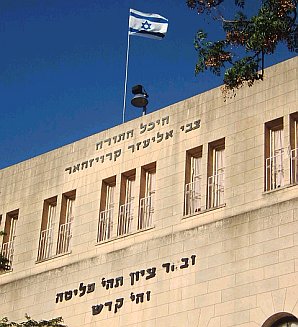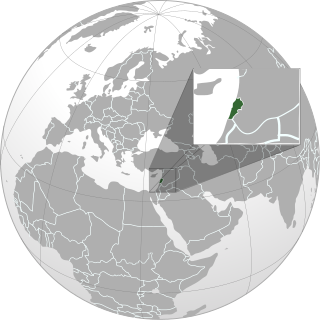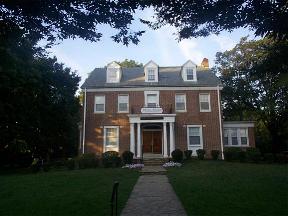
Zionism is an ethnocultural nationalist movement that emerged in Europe in the late 19th century and aimed for the establishment of a homeland for the Jewish people through the colonization of Palestine, an area roughly corresponding to the Land of Israel in Judaism, and of central importance in Jewish history. Zionists wanted to create a Jewish state in Palestine with as much land, as many Jews, and as few Palestinian Arabs as possible. Following the establishment of the State of Israel in 1948, Zionism became Israel's national or state ideology.
The Union for Reform Judaism (URJ), formerly known as the Union of American Hebrew Congregations (UAHC) until 2003, founded in 1873 by Rabbi Isaac Mayer Wise, is the congregational arm of Reform Judaism in North America. The other two arms established by Rabbi Wise are the Hebrew Union College-Jewish Institute of Religion and the Central Conference of American Rabbis. The current president of the URJ is Rabbi Rick Jacobs.

Religious Zionism is a religious denomination that views Zionism as a fundamental component of Orthodox Judaism. Its adherents are also referred to as Dati Leumi, and in Israel, they are most commonly known by the plural form of the first part of that term: Datiim. The community is sometimes called 'Knitted kippah', the typical head covering worn by male adherents to Religious Zionism.
The Baltimore Hebrew Congregation is a Reform Jewish congregation and synagogue located at 7401 Park Heights Avenue, in Pikesville, on the border of Baltimore City and Baltimore County, Maryland, in the United States.
Reform Zionism, also known as Progressive Zionism, is the ideology of the Zionist arm of the Reform or Progressive branch of Judaism. The Association of Reform Zionists of America is the American Reform movement's Zionist organization. Their mission “endeavors to make Israel fundamental to the sacred lives and Jewish identity of Reform Jews. As a Zionist organization, the association champions activities that further enhance Israel as a pluralistic, just and democratic Jewish state.” In Israel, Reform Zionism is associated with the Israel Movement for Progressive Judaism.

Congregation Beth Elohim, also known as the Garfield Temple and the Eighth Avenue Temple, is a Reform Jewish congregation and historic synagogue located at 274 Garfield Place and Eighth Avenue, in the Park Slope neighborhood of Brooklyn in New York City, New York, United States.

From the founding of political Zionism in the 1890s, Haredi Jewish leaders voiced objections to its secular orientation, and before the establishment of the State of Israel, the vast majority of Haredi Jews were opposed to Zionism, like early Reform Judaism, but with distinct reasoning. This was chiefly due to the concern that secular nationalism would redefine the Jewish nation from a religious community based in their alliance to God for whom adherence to religious laws were "the essence of the nation's task, purpose, and right to exists," to an ethnic group like any other as well as the view that it was forbidden for the Jews to re-constitute Jewish rule in the Land of Israel before the arrival of the Messiah. Those rabbis who did support Jewish resettlement in Palestine in the late 19th century had no intention to conquer Palestine and declare its independence from the rule of the Ottoman Turks, and some preferred that only observant Jews be allowed to settle there.

Henry Pereira Mendes, was an American rabbi who was born in Birmingham, England and died in New York City. He was also known as Haim Pereira Mendes.

The history of the Jews in Lebanon encompasses the presence of Jews in present-day Lebanon stretching back to biblical times. While Jews have been present in Lebanon since ancient times, their numbers had dwindled during the Muslim era. Through the medieval ages, Jewish people often faced persecution, but retained their religious and cultural identity.

Rabbi Aharon Feldman is an Orthodox Jewish rabbi and rosh yeshiva (dean) of Yeshivas Ner Yisroel in Baltimore, Maryland. He has held this position since 2001. He is also a member of the Moetzes Gedolei HaTorah.

Rabbi Gavriel Zev Margolies was an Orthodox Rabbi in the United States known for being an uncompromising traditionalist.
Congregation Am Tikvah is a combined Conservative and Reform Jewish congregation and synagogue located at 625 Brotherhood Way in San Francisco, California, in the United States. The congregation was formed in 2021 as the result of the merger of the Conservative B'nai Emunah and the Reform Beth Israel Judea congregations, with the latter formed in 1969 through a merger of the Conservative Congregation Beth Israel and the Reform Temple Judea. The congregation is affiliated with both the Union for Reform Judaism and the United Synagogue of Conservative Judaism.
Isaac Landman was an American Reform rabbi, author and anti-Zionist activist. He was editor of the ten volume Universal Jewish Encyclopedia.
The American Council for Judaism (ACJ) is a religious organization of American Jews committed to the proposition that Jews are not a national but a religious group, adhering to the original stated principles of Reform Judaism, as articulated in the 1885 Pittsburgh Platform. In particular, it is notable for its historical opposition to Zionism. Although it has since moderated its stance on the issue, it still advocates that American Jews distance themselves from Israel politically, and does not view Israel as a universal Jewish homeland.

Proto-Zionism is a concept in historiography describing Jewish thinkers active during the second half of the 19th century who were deeply affected by the idea of modern nationalism spreading in Europe at that time. They sought to establish a Jewish homeland in the Land of Israel. The central activity of these men took place between the years 1860 to 1874, before the establishment of practical Zionism (1881) and political Zionism (1896). It is for this reason that they are called precursors of Zionism, or proto-Zionists.

Few Jews arrived in Baltimore, Maryland, in its early years. As an immigrant port of entry and border town between North and South and as a manufacturing center in its own right, Baltimore has been well-positioned to reflect developments in American Jewish life. Yet, the Jewish community of Baltimore has maintained its own distinctive character as well.

Reform Congregation Keneseth Israel, abbreviated as KI, is a Reform Jewish congregation and synagogue located at 8339 Old York Road, Elkins Park, just outside the city of Philadelphia, Pennsylvania, in the United States. Founded in Philadelphia in 1847, it is the sixth oldest Reform congregation in the United States, and, by 1900, it was one of the largest Reform congregations in the United States. The synagogue was at a number of locations in the city before building a large structure on North Broad Street in 1891, until 1956 when it moved north of the city to suburban Elkins Park.

Temple B'nai Israel is a Reform Jewish congregation and synagogue located at 4901 North Pennsylvania, Oklahoma City, Oklahoma, in the United States. The congregation is the oldest active Jewish congregation in Oklahoma.
Tzedek Chicago is a Progressive Jewish congregation and synagogue, located in Chicago, Illinois, in the United States. It is one of the first synagogues in the United States to officially declare itself anti-Zionist.

Maximilian Heller was a Czech-born American rabbi.













